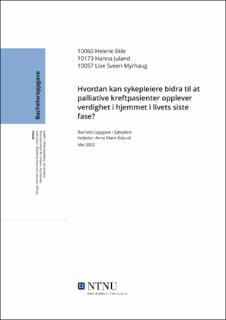| dc.contributor.advisor | Åslund, Anne Marit | |
| dc.contributor.author | Ekle, Helene | |
| dc.contributor.author | Juland, Hanna | |
| dc.contributor.author | Myrhaug, Live Sveen | |
| dc.date.accessioned | 2022-07-05T17:19:30Z | |
| dc.date.available | 2022-07-05T17:19:30Z | |
| dc.date.issued | 2022 | |
| dc.identifier | no.ntnu:inspera:106262086:112059416 | |
| dc.identifier.uri | https://hdl.handle.net/11250/3002830 | |
| dc.description.abstract | Introduksjon/Bakgrunn: Forekomsten av kreft øker, og mange kreftpasienter ønsker å tilbringe den siste tiden hjemme. Økningen i antall kreftpasienter stiller krav til kommunehelsetjenestens sykepleiere, som må tilrettelegge for og sikre en verdig palliativ omsorg i hjemmet.
Hensikt: Å belyse hva forskning og annen faglitteratur vektlegger av verdighetsbevarende faktorer ved palliasjon til hjemmeboende kreftpasienter.
Metode: En litteraturstudie som inkluderer fem forskningsartikler. Søkeord som palliative, end of life care, cancer patients, home health care, nursing role, human dignity, integrity, quality of care, experiences og challenges ble benyttet for å finne artiklene i Cinahl og Ovid Medline.
Resultat: Kompetanse, ivaretakelse av autonomi, pårørende som ressurs, tidlig intervensjon og tilgjengelig og trygghet er sentrale faktorer som bidrar til verdighet ved palliativ omsorg i hjemmet.
Konklusjon: Det finnes mange faktorer som påvirker kreftpasientens opplevelse av verdighet i livets siste fase. En viktig forutsetning er at sykepleieren innehar god og oppdatert kompetanse som vil dekke pasientens ønsker og behov, samt ivareta pasientens autonomi gjennom personsentrert omsorg. Sykepleiernes samarbeid med både pårørende og involverte profesjoner er avgjørende for opplevelsen av trygghet og verdighet. Tilgjengelighet og tidlig intervensjon vil sikre et godt pasientforløp og ivareta pasientens verdighet. | |
| dc.description.abstract | Introduction/Background: The occurrence of cancer increases, and many cancer patients want to spend the last stages of life at home. The increase in the number of cancer patients demands the community nurses to facilitate and secure a dignified palliative care in the patient's own homes.
Purpose: To raise awareness on what research and other literature emphasize of dignity preservation factors when it comes to palliative care to cancer patients living at home.
Method: A literature review that includes five research articles. Keywords such as palliative, end of life care, cancer patients, home health care, nursing role, human dignity, integrity, quality of care, experiences and challenges were used to find the articles in Cinahl and Ovid Medline.
Result: Competence, preservation of autonomy, family as a resource, early intervention, availability and safety are key factors which will contribute to dignity for palliative care in the home.
Conclusion: There are numerous factors that will affect cancer patient's experiences of dignity at the end of life. The nurse's competence is necessary to preserve the patient's wishes and needs, and to maintain the patient's autonomy through person-centered care. The nurses' cooperation with the family and other involved professionals are crucial for the experience of safety and dignity. Availability and early intervention will secure a good course for the patient and maintain the patient's dignity. | |
| dc.language | nob | |
| dc.publisher | NTNU | |
| dc.title | Hvordan kan sykepleiere bidra til at palliative kreftpasienter opplever verdighet i hjemmet i livets siste fase? | |
| dc.type | Bachelor thesis | |
